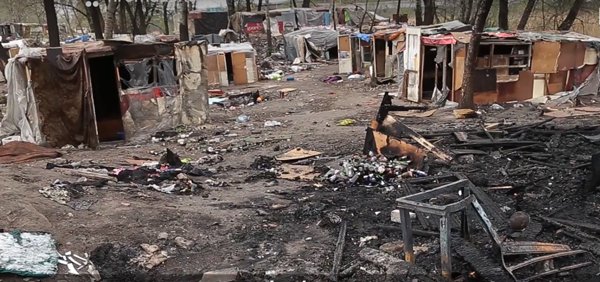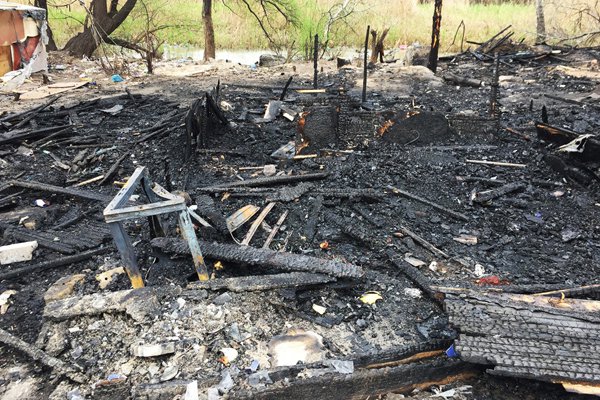Kiev Calling: Ethnic Cleansing Ahead of Eurovision Song Contest
12 May 2017
By Jonathan Lee and Volodymyr Navrotskyy
More than 300 people, over a 100 families, have been forced to leave their homes in Kiev after threats were made against their lives in the beginning of April. Only a day after the last families departed, the threats were carried out and six houses burned to the ground, likely with Molotov cocktails. The police had full knowledge of the severity of the threats that were made, yet no preventative measures were taken. In fact, some residents even had assistance from the police in purchasing tickets to leave. Their eviction coincides with the city's preparation to host the 2017 Eurovision Song Contest, the final of which will taker place on 13 May.
This attack did not happen in Eastern Ukraine, it happened in the centre of Kiev. Those responsible were not Russian separatists, they were ordinary residents of the city. And those whose homes were attacked were not part of a political faction, or involved in terrorist activities – they were Roma.

Photo Credit: Public TV.
The Romani community at Kanalna Street in Dniprovsky, Kiev have lived there for at least five years. Prior to their leaving, there were numerous negotiations with representatives of the community to get them to leave the area after non-Roma residents had complained to authorities about worsening sanitation in the area. It seems that some decided that the the best way to tackle poverty, was to take matters into their own hands and drive people out with threat of violence, and then burn their homes down.
A representative of the Ombudsman's Office, Aksana Filipishina explained that local residents often complain of an increase in criminality due to the Roma living in the area. However, when the Ombudsman made a police inquiry, the reply was that the level of criminality had not changed in the area in the period since the Roma arrived. Ms. Filipishina commented that it seems the complaints from non-Roma are largely based on negative stereotypes, and are not backed up by evidence from the police.
The European Roma Rights Centre (ERRC), an international NGO that challenges rights abuses through legal action, is investigating the case with human rights monitors and is also pursuing a freedom of information request with the police and city council. In the course of their investigation they uncovered some suspicious information which suggests the authorities allowed, or even advocated, the removal of the Roma from the settlement in Dniprovsky.
According to President of the ERRC, Đorđe Jovanović “the whole situation has many of the hallmarks of a pogrom, but has been carried out in a more covert manner in the guise of community consultation”. The role of the authorities in the matter brings the additional term, ethnic cleansing, to mind - particularly the actions of the City Council, whose representatives quickly supported the 'cleaning' of the park zone where the Romani houses were located. Not to mention the inaction of the police regarding the threats, and their direct involvement in aiding the Roma leave the city, both of which amount to complicity according to Mr. Jovanović.
In the days leading up to the attack, police visited the Romani settlement several times, but not to protect the people living there, they came to register them and take fingerprints. The ERRC and other NGOs say the police ignored reports of masked men threatening the Roma in the area.

Photo Credit: Public TV.
Perhaps the most damning information came a few days before the fire when Andrij Strannikov, a member of the City Council, posted to Facebook that he had a plan to get rid of the Romani settlement using the police, but he could not disclose the full details at that time.
The Ombudsman has requested an investigation, and a number of Ukranian NGOs have condemned the attack and the police for failing to protect the Romani residents. The Special Representative of the Secretary General of the Council of Europe has emphasized that evicting people without preparing them for resettlement has serious impacts on the life of Romani residents of the city. He has called on Kiev City Council to cease removing Roma from informal settlements and provide compensation for those who have already been evicted.
The driving out of Roma and the destruction of their homes, echoes the events of 27 August 2016 in Loshchynivka, Odessa Oblast where the entire Romani population was forced to flee an angry mob who later destroyed their homes. Across the border in Romania, less than a week before the attack in Kiev, another mob of non-Roma attacked Romani homes in a village in Harghita, dragging families onto the street and beating them while their houses were burned down.
However, these attacks happened in small villages in the countryside, not in the center of a capital city. The uncertain nature of City Council involvement also sets the most recent eviction in Kiev apart from these other violent removals of Romani communities. The threats against Roma at Kanalna Street, and the attack on their homes, suggests that Kiev City Council have opted to return to an older, more conservative approach to evicting Roma. One where they do not have to invest resources in private security, police time or demolition companies – instead they can simply withdraw basic services and ensure police do not enforce the rule of law while Roma are quietly moved out by intimidation, pseudo-consultation and 'concerned parties'.
Aside from the suspicious lack of protection from authorities, the City Council and police have taken completely the wrong approach to trying to solve the problems arising over the informal Romani settlement. Instead of addressing the issues of why the informal Romani settlement emerged in the first place, they have tried to address the consequences and move the people on to somewhere else for a short-term fix.
This demonstrates either a lack of awareness or a complete policy deficit towards the root causes of the settlement. The level of unemployment, social exclusion, illiteracy, lack of identification documents and lack of housing options in their usual place of residence (Zakarpattya and other regions of Ukraine) are so high that these Roma are willing to move all the way to Kiev and into a park in the center to try and scratch out a living.
Moving Roma on does not aid social inclusion; it disrupts education and continues the cycle of poverty and casual employment where Roma are forced to live hand-to-mouth rather than be allowed to earn stable employment. Once again, these people have been excluded and abandoned by society, but at the same time they have not disappeared - their problems have not ceased to exist, and the result of the recent action only postpones the emergence of the same issues further down the road.
The eviction occurring just a month before the commencement of Eurovision 2017 is certainly a suspicious coincidence. It seems that Kiev's urban clean-up preparations in the run up to the contest also extend to clearing out those who are deemed to be undesirables. The evident erosion of human rights by co-opted police and corrupt officials is damaging to the basic societal values of the citizens of Kiev. If we allow this eviction to go unchallenged, we risk solidifying what is already fast becoming a very dangerous precedent in Kiev.
Such actions also stand in stark contrast to the values of solidarity, cooperation and overcoming differences, on which Eurovision was founded. Incredibly, the contest's theme for this year is Celebrate Diversity - a parody of the reality on the ground. Executive Supervisor Jon Ola Sand described the message as “at the heart of Eurovision values”. He said this year's competition is “all-inclusive” and will be a “joining together to celebrate both our common ground and our unique differences”. With the competition finals yet to even begin, so far, there has been little to celebrate in Kiev.
Thıs blog is also available in Ukrainian.




